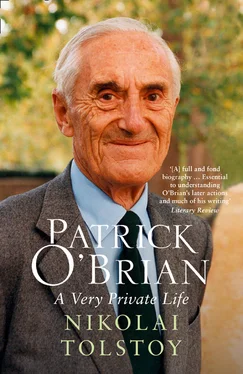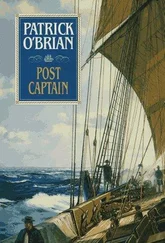As time went by I was invited to his home to meet his mother. They lived in a flat on the first floor at 237, Kings Road Chelsea. Adjacent to the first floor landing was the kitchen/dining area then up some more stairs to the living room – quite large and very cold in Winter, despite a small fire.
I found his mother Elizabeth a small, charming and very well spoken lady with whom I had a good rapport. Little mention was ever made about his father, except that he lived in the south of France. At that age you accept things readily and don’t question.
Subsequently, Bob found conditions at Richard’s home materially improved:
One day I arrived at Richard’s home and went into the living-room with him, discovered it was no longer cold but nicely warm. He pointed to a brand new stove that had been installed in the fireplace and which gave out a marvellous warmth …
One Christmas I was invited to Christmas dinner. Elizabeth had prepared a wonderful feast. There was a complete roasted goose with all the trimmings – it was an unforgettable occasion. Elizabeth was a kind and generous lady who worked hard as a seamstress. I often saw her patiently repairing nylon stockings for customers. Such luxury items were hard to come by and then very expensive. She also worked at the Chelsea Arts Club in the evening.
Richard was now thirteen, when a combination of factors served to place his relationship with his father on an altogether happier basis. No longer confined in isolated contiguity with his at times testy parent, he was also outgrowing tiresome childish failings which all too easily provoked Patrick’s simmering wrath. The permanent rift which was one day to develop between them lay far in the future, and as will be seen did not in any case originate with Patrick. It looks as though Richard’s eventual decision to abandon relations with his father led him (as may too often occur in such unhappy cases) to reinterpret or confuse his memories of the past. Looking back from 2000, he recalled of this period:
Later, my father moved to France and I was delighted to return to my mother. Over the years I continued to visit my father and Mary but our relationship didn’t develop much further. He was not an easy person to get near. He was not affectionate; there were no quick hugs or pats on the shoulder. Nor was there much fun about him. Everything was a little bit heavy. He could also be very, very sarcastic. There was one incident that I remember clearly. He was extremely good at sharpening knives. ‘That looks interesting,’ I thought, so I had a go. His comment was: ‘I’ve seen angle-irons sharper than that.’ He could have thought of something pleasant to say.
I can confirm that Patrick was instinctively averse to ‘quick hugs or pats on the shoulder’, which he had rarely experienced in his own childhood. But so in my experience were many fathers at that time, and this, like much else in Richard’s subsequent assessment, suggests judgements formed in a radically different era. While the clumsy attempt at humour (which I suspect the knife-sharpening exchange to have been) may or may not have upset the boy at the time, there exists abundant evidence that Richard’s memory in later life could deceive him in material respects.
In the 1950s Patrick appears to have been unaware of any suggestion of coldness in their relationship. Pondering the matter, he jotted in a notebook:
The dialogue between a man and his son an inner dialogue. The well-known lack of communication is no more than a lack of contact on the surface – words, formal communication – and in fact the generations are linked to a sometimes intolerably intimate degree – secret glances instantly and wholly understood, disapproval felt, affectations detected hopelessly because hereditary …
This passage is further interesting, suggesting as it does Patrick’s sincere, if at times excessive, concern to eradicate failings in his son which he ascribed to his own boyhood experience.
Richard, like many of us on occasion, was undoubtedly capable of unconsciously ‘editing’ his early childhood memories long years after the event. An illuminating example is provided by an episode he recounted in a press interview, in which he attacked his father’s memory. ‘When I was five he sent me a present – a bottle of malt and cod liver oil, something no five-year-old would want. That was the year that [Richard’s sister] Jane died.’[7]
This reads as though it were a direct memory of a long-distant event. In reality, he first learned of it from a letter discovered by his mother Elizabeth in ‘an old box’, which she sent to Richard’s daughter Joanna. Elizabeth’s letter is undated, but since Joanna was born in 1969 it is unlikely to have been written before the 1980s. The trove of material discovered in the old box included the letter in question (also undated), which conveyed birthday wishes and what Patrick described as ‘a rather revolting sort of birthday present – to wit, some malt and cod-liver oil. But reflect that it is good for you, and see if you can enjoy it.’ To this Patrick appended some amusing verses and accompanying sketches, after the style of Hilaire Belloc.
Elizabeth, whose memory must in this case be preferred to that of her then infant son, wrote that he was at the time not five as he later asserted, but ‘about 3 years old’ – i.e. two years before his sister Jane died. In view of Richard’s age, the letter plainly represented a jeu d’esprit , intended for the mother’s amusement rather than that of the small unlettered infant. Furthermore, given that we know nothing of the context, it seems not unlikely that Richard really was ill (his birthday was at the beginning of February), and the announcement that the medicine was a birthday present reflected nothing more than a private joke to be shared with his mother. Indeed, the letter concludes with a mock-sinister verse about a scorpion, on which Patrick commented: ‘I’m afraid that last one won’t appeal to you very much, but your mother might like it.’[fn9]
Letters from Richard’s Chelsea home delighted my parents after their arrival in Collioure in 1949, including as they did many artless touches of boyhood enthusiasm. ‘I have been four day’s in bed with tonsilitis,’ he reported: ‘that means I will have my tonsils out, maybe I will grow wiser on account of my tonsils being cut out.’ He was beginning to evince encouraging interest in literature, and used the pocket money they sent him to buy such sterling boys’ fare as the works of Rider Haggard, Alexandre Dumas and R.M. Ballantyne. There were regular reports on Sian the boxer’s welfare and her occasional ‘weddings’, which resulted in numerous offspring. He attended his first communion at Chelsea’s Catholic church: ‘Father de Zulueta is giving me a Bible as my own [Authorized Version] is anti-catholic, however I shall keep it.’
Excitement mounted as across the river preparations began for the 1951 Festival of Britain in Battersea Park, which Richard roundly condemned as an expensive white elephant. He received letters from his father and my mother almost every week, money being punctiliously despatched whenever required, and at whatever sacrifice to the impoverished O’Brians. As a growing boy, he regularly required new clothing. On one occasion they provided him with a complete cricket outfit, which he was aware ‘was very expensive’. Gratifyingly, ‘when I put all the clothes on I looked like a proffessional cricketer’. Patrick took a keen interest in Richard’s sporting activity, and the latter responded with detailed accounts of matches: ‘Thank you for the lovely parcle of buscuits and advise on cricket.’ He was looking forward to coming out to France, but ‘was rather horrified at the thought of the journey.’ Furthermore, ‘I am afraid I have forgotten all my French as we say almost the same thing every lesson, “come and stand here”, “do you come here?” I think the master askes most silly questions.’ When my mother told him she was teaching Odette Bernardi to speak English, Richard rejoiced at the prospect of being able to speak to her.
Читать дальше












